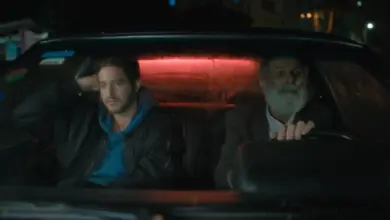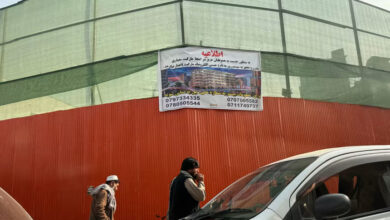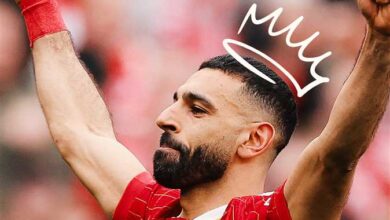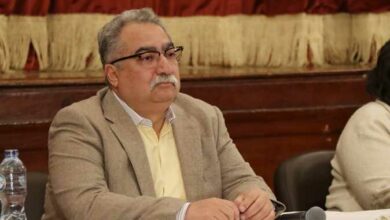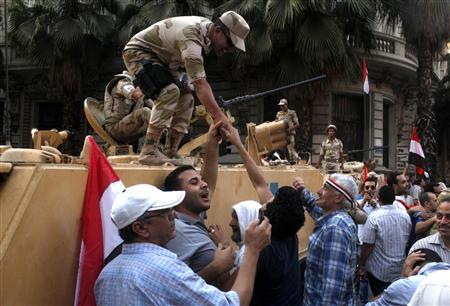
Today at 2am Cairo time, viewers from around the world will tune into the annual Oscars ceremony, where an Egyptian film has been nominated to win the "Best Documentary Feature" for 2014.
The Square, a documentary film about the “ongoing” Egyptian revolution, is one of five films that have been nominated for the category after winning the Audience Award at Sundance Festival in 2013.
The film documents the course of Egypt's three-year-long political upheaval during and after Mubarak’s ouster until the first civilian president Mohamed Morsy was unseated by the military. This all happens through the eyes of a handful of Tahrir Square protesters while transporting the viewer deeply into the intense emotional drama and personal stories behind the news.
According to some film critics, the Square is likely to be the first Egyptian film ever to win the high-profile Oscar in the category of the Best Documentary Feature, let alone it is the first time an Egyptian film get nominated for such award.
“Oscar tends to give awards to politically-motivated films rather than quality artistic films as Cannes does. It gave its award to Argo last year which was not a quality film but rather has a political dimension,” said Mohamed Shafie, a cinema critic and actor. “In that sense, the Square has a potential to win.”
The documentary takes viewers through an immensely moving and emotional journey, laden with hope, euphoria, courage, betrayal, perseverance and frustration.
Though it has been internationally acclaimed and screened in many countries worldwide, it has not yet been officially approved to be premiered in Egypt’s theatres.
Well-known producer Marianne Khoury told Mada Masr that getting approval from Egypt’s censorship body has been an extremely difficult process due to the film’s sensitive content, which includes a lot of brutally raw footage of the excessive violence used by the Egyptian military and security forces against protestors over the past three years.
The film by Egyptian-American Jehan Noujaim has received international positive reviews upon its screening in many countries including London-based Frontline club, where the film was fully booked a week earlier.
The film premiered on January 18, 2013 at the 2013 Sundance Film Festival, where it won the Audience Award for World Cinema in the documentary category. Due to the ongoing nature of the Egyptian revolution, Noujaim updated the ending of the film over the summer of 2013.The film was subsequently also named winner of the People's Choice Award in the documentary category at the 2013 Toronto International Film Festival.
Though social media was a catalyst for the Arab Spring, it was also a tool that helped spreading the film nationwide. The film was downloaded and uploaded on YouTube and has been widely seen across Egypt in homes and coffee shops, shared on Facebook and discussed on social media.
Internationally, the film had its impact on the budding revolution movements overseas. It was recently dubbed into Ukrainian and downloaded some 300,000 times by protesters there and shown in the square, in Kiev.
There is a video on YouTube showing a public screening of the film in the Maidan of Kiev where protesters standing and showing full attention to the film events which might be has a futuristic view of what is going to happen in Ukraine after Russian military soldiers began deploying its troops in the country. A dubbed version is now spreading in Russia too, said the film’s director Jehane Noujaim.
Reaction among revolutionaries
Yet, some young activists who participated in the 18-day uprising slammed the film as it was made from a “classy” perspective targeting the international audience rather than a local one.
“The film ignored the people who got killed and injured during the revolution, and instead focused on a guy who is just talking and sounds [like he's] acting,” says Shams Salem, 24-year-old drummer who participated in the revolution, “people who were killed and had chronic injuries are the characters who would best represent the Egyptian revolution.”
Islam Zaki, 29, a diving trainer in Sharm el-Sheikh resort said the positive thing about the film is “the merge of all social classes together in Tahrir’s pot.”
Another political activist who preferred to remain anonymous said the film did not include one of the most critical periods in the revolution, missing a six-month period starting from December 2011 and unreasonably jumped to presidential election in 2012.
“The film missed Port Said football massacre in February 2012 and Ultras who are still protesting until now,” she said. At least 79 people were killed and more than 1,000 were injured in Port Said Stadium riot.
The first release in London came shortly before the 25 January revolution anniversary this year in a time a political turmoil is engulfing the country after the military’s nation-wide crackdown on Muslim Brotherhood and other military opponents.
The controversial film’s cinematographer Cressida Trew and protagonist Khalid Abdalla presented the 99-minute-long film for around 200 British and Arab audiences.
Through the personal stories, the film documents the unorganized, leaderless revolutionary young people who were fighting against Mubarak’s brutal regime. Unexpectedly, Mubarak’s ouster was not the end but rather a beginning of more battles and getting into darker tunnels.
More organized forces, who claimed they were part of the revolution, sought directing the revolution for their political goal. The most organized ones include the military, who was in charge of killing and torturing many revolutionaries during the 18-month transition, as well as the Muslim Brotherhood, who revolutionaries alledge made a deal with the military in order to rise to power.
The film’s main characters
Through the main three characters, the director vividly portrayed the story of young people claiming their rights, struggling through multiple forces from the brutal army dictatorship willing to crush protesters using military tanks, to a corrupt Muslim Brotherhood using its mosques to manipulate the voters, in the fight to create a “society of conscience.”
The first, Khalid Abdalla, is introduced by Ahmad Hassan, the main protagonist as “an Egyptian who lived abroad and decided to go down to the square and protest" against both Mubarak’s and the military’s brutality until he ended up forming a movement called Mosireen, a non-profit media activism group aimed at documenting the events during and after the 2011 Egyptian revolution in a bid to document human rights abuses against protesters and to challenge state media narratives.
Abdalla's father and grandfather were well-known anti-regime activists in Egypt. His parents were both physicians who immigrated to the UK before he was born. At London’s premier of the film, Abdalla identified himself as a person who came from three generations who were fighting for political reform in Egypt. “This is in my blood,” Abdalla said, referring to his passion.
Another main character is Ahmad Hassan, who is a twenty-something activist from the working-class district of Shobra who is evolving during the three-year-long political turmoil, from a street revolutionary to an activist who has persuasion and debate skills. “I started working when I was eight years old. In fifth grade, I used to pay my school tuition. I was selling lemons in the street. There was no hope for a better future in this country,” he says as he introduces himself in the film.
Hassan is a key part of the defense of Tahrir in the 18 days leading up to Mubarak’s resignation, but unlike others, Muslim Brotherhood and Islamists, he continued protesting against both the military and Islamists after he saw things getting worse and protesters being killed and rounded up. “The biggest mistake revolutionaries made is that they left the square before legitimacy was in our hands,” he said.
After the euphoria resulted from Mubarak’s ouster, Hassan says, “The regime (we fight to overthrow) is not only Mubarak, the regime is all country’s institutions and they all have to change so we are going back to the square.”
Hassan is famously quoted in the film as saying, “We are not looking for a ruler to rule us, everyone went down to Tahrir Square has leadership skills, we are looking for a conscience.”
At the square, Hassan met Magdy Ashour, a Muslim Brotherhood member who was arrested and tortured many times at the hands of Mubarak’s brutal state security; both Hassan and Ashour as well as Abdalla start a journey of fighting for justice and freedom, until they both get separated after Mubarak’s ouster when Muslim Brotherhood gave blessings to the military brutalities against protesters.
Though Ashour is religious, he is also a dynamic character, evolving through the fast-paced course of actions and soonrealizes that he is a revolutionary rather than a Brotherhood member and his place is always the square.
The three characters, almost serve as a microcosm, representing different factions of Egyptian society in their behaviors and interactions.
Abdalla discusses the film during London premiere
After the film was shown at the premiere in London, reporters had the opportunity to ask Abdalla and his family questions about the work.
When asked about his view of the current situation in Egypt and where it is leading the country, Abdalla said, “When we speak of the current situation now, we have a massive return to the police state, we have massacres that have been taken place, we have a media that has been completely taken over. And we have a mass popular support for the army and the police state, which is primarily built by hatred toward the Muslim Brotherhood as well as the sense of frustration of inability to get what people want.”
“But when the idea of Muslim Brotherhood fear fades away,” Abdalla continued, “when the current military rule does not give the people the social justice they want, then rumbles begins again, you have to have this faith.”
Abdalla’s wife Cressida Trew, who worked in the documentary, said the makers were filming and running around 15 characters for the film. “There were amazing people, but they did not all care to be filmed. Hassan was the one who knew how to open up in front of the camera, and the camera loved his face. He is charismatic when speaking to people, and people listen to him. He has a key voice within the revolution,” said Trew.
Abdalla agreed, saying that Hassan was generous for letting himself be filmed.
In the time that military claimed they protect the revolution, supported by the state media, Abdalla was seen in the documentary speaking to his father about the media brainwashing people for the service of the military, and was seen in another scene telling young people that anyone has a camera should film as much as he or she can.
“In Mohamed Mahmoud, when we saw a soldier pulling a corpse in the rubbish, this was a game-changing moment within the story of what was happening in Egypt, because people saw this footage, people who believed that the army was protecting the revolution, suddenly they saw that the army throwing a body into the rubbish,” Abdalla said.
Abdalla’s father who was also at the premier of the film said, “People in the street changed a lot of the culture. The problem is that you have a totalitarian regime who knows what they want, you have Muslim Brotherhood who knows what they want, and in the middle you have leftists and socialists, who claim they know what they want but in reality they are divided. They have great political ideas but lacking the political mechanism to achieve what they want, so they rely on these young people in the street who are fighting.”
The Oscars for Egyptian viewers will be available starting with red carpet ceremonies at 2am Cairo Time on the Dubai One channel.

